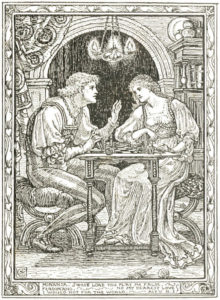Can we make a list of all the different displays of Prospero’s magical powers?
1) He knows that a ship full of his enemies is approaching the island. How long has he known that? Were they coming near his island originally or did he have something to do with them coming that way?
2) He doesn’t actually cause the tempest, ironically enough — Ariel does.
3) Speaking of which, he’s got whatever powers he needed to not only free Ariel from his imprisonment, but to keep the spirit as his own servant. Consider how powerful Ariel must be – not only causing the Tempest, but keeping all the sailors safe and unharmed – and what sort of power Prospero has over him. Or is it a power at all? Is it just repayment for freeing him from the tree? Ariel certainly seems like he’d leave if he could, at some points.
4) He regularly causes Caliban physical pain (“pinches” and “cramps”).
5) He puts Miranda to sleep at will.
6) He “charms” Ferdinand, whatever we choose for that to mean. I like to imagine Prospero actually animating Ferdinand’s frozen limbs like a puppet master, walking him around against his will. He tells Ferdinand “I can disarm you with my stick from here” but that doesn’t necessarily mean that he does. But how cool would a martial arts sword-versus-staff battle have been?
7) When he wants to watch the vanishing banquet and Ariel’s harpy act, he turns invisible. Unclear how much of that is Ariel and how much is Prospero.
8) He and Ariel chase Caliban and the others with hounds that appear out of nowhere. Unclear if this is suppose to be a trick of Ariel’s, or Prospero’s.
9) He brings forth the goddesses to bless his daughter’s marriage, as a show of his power.
Are there any other overt displays of his work?
He gives us another list of things that he can do, when he’s talking about leaving the island:
I have bedimm’dThe noontide sun, call’d forth the mutinous winds,And ‘twixt the green sea and the azured vaultSet roaring war: to the dread rattling thunderHave I given fire and rifted Jove’s stout oakWith his own bolt; the strong-based promontoryHave I made shake and by the spurs pluck’d upThe pine and cedar: graves at my commandHave waked their sleepers, oped, and let ’em forthBy my so potent art.
My favorite part of that speech is “graves at my command have waked their sleepers, oped, and let ’em forth.” So, basically, zombies? Awesome.
How much of Prospero’s magic is the from the island itself, do you think? Even if he didn’t break his staff and drown his books, would he have retained his powers after he returns to Milan?



 to 1 (200k or so misquotes to about a million instances of the actual quote).
to 1 (200k or so misquotes to about a million instances of the actual quote).